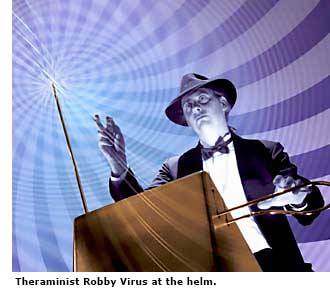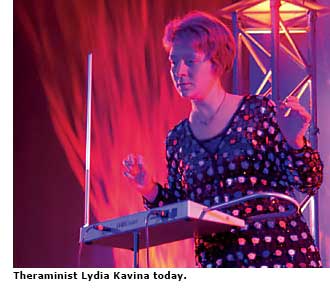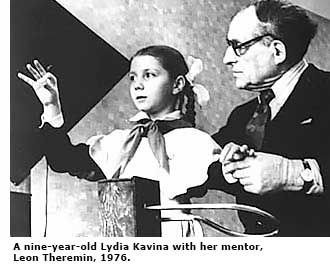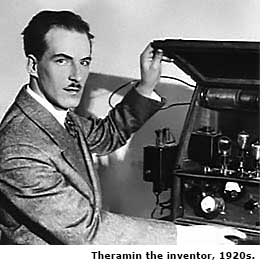From Russia with Modernism: Theremin

Brian Wilson had a mid-century moment with the theremin years before he put the musical instrument to use in the Beach Boys' chart-topping 1966 hit 'Good Vibrations.'
As a Southern California eight-year-old in 1950, "My mom and dad took me over to a friend's house," Wilson recalls in the award-winning documentary, 'Theremin: An Electronic Odyssey.' The friend began playing the theremin, "and I was scared to death of that sound," Wilson continues. "It sounded like one of those scary movies. It was almost sexual."
To this day, many associate the sound of the theremin with themes of invaders from outer space in mid-century science fiction flicks and with the trippiness of 'Good Vibrations.' These associations continue to cloak the theremin's integrity as a legitimate musical instrument.
Nonetheless, the theremin is distinguished as the world's first musical instrument based on electronic circuitry and the only one that does not have to be touched to be played.
The theremin has moved across repertoires—from classical to film soundtracks to New Age to lounge music—but 88 years after its invention by the Russian for whom it was named, the theremin remains an object of fascination as much as confusion and underestimation. It's also a source of mysterious sound, which can suggest a spectral, wordless vocalist or an enchanted violinist from another world.

Lydia Kavina, granddaughter of the late Leon Theremin's first cousin and one of Theremin's last pupils, laughingly recalls the affront of a fellow Russian, composer Vladimir Martynov, at the Tschaikovsky Conservatory in Moscow, where Kavina studied music theory and composition, as well as traditional piano, but championed the theremin.
"He would say, 'Lydia, I like your performance so much, and I like you as a musician so much. You are such a beautiful musician. But, please, do not play theremin!"
Robby Virus (that's his stage name) has found that his role as thereminist in the San Francisco lounge band Project: Pimento is sometimes misconstrued. At one recent performance, a woman approached the band's drummer, Aaron Wallbanger, during a break. "You guys are really good—it sounds great," she enthused. "But I don't understand why you have this guy up there miming to all the songs."
The fan's impression was understandable. Virus's theremin, an Ethervox model manufactured by the North Carolina-based Moog Music, looks like a large wooden cabinet with a metal antenna extending vertically from its right side and another piece of metal looping horizontally from its left side.
Virus creates musical notes by varying the position of his right hand in relation to the antenna, and controls the volume with similar movements of his left hand around the loop. To the uninitiated, it might seem like the waving motions of a mime, when in fact it's the result of years of musical training.

For Kavina, the training came at age nine, after several years of piano, directly from Theremin himself, who took an hour crossing the city of Moscow to get to her, after finishing his work at the Department of Acoustics at Lomonosov University.
"He always brought me cakes," Kavina recalls about Theremin, to whom she refers by his Russian name, 'Lev Termen.' "It wasn't like a teacher who comes to a kid's house and then gets his fee—no way like that. It was really a nice communication between relatives...not that strict at all. It was an hour of making music together, let's say."
The atmosphere of love and respect with which Leon Theremin was greeted by his cousin's family sustained him through the frustrations of his day job, at which he struggled to put his creative and inventive mind to work for the benefit of the Soviet state.
"To be an inventor with new ideas, and at the same time an old inventor, it was quite hard," explains Kavina, who is currently based in England and speaks her adopted language with traces of a Russian accent and syntax. "And also, he had this name of being former prisoner," having been for years shut up in a 'sharashka,' a special-assignment detention facility, by former Soviet despot Josef Stalin.





